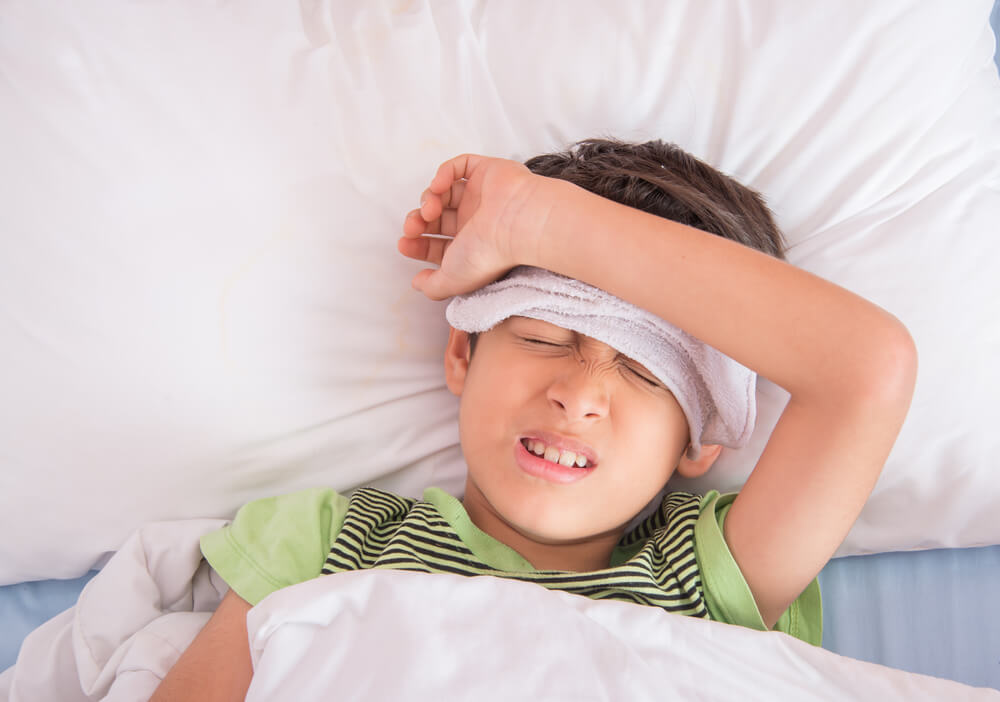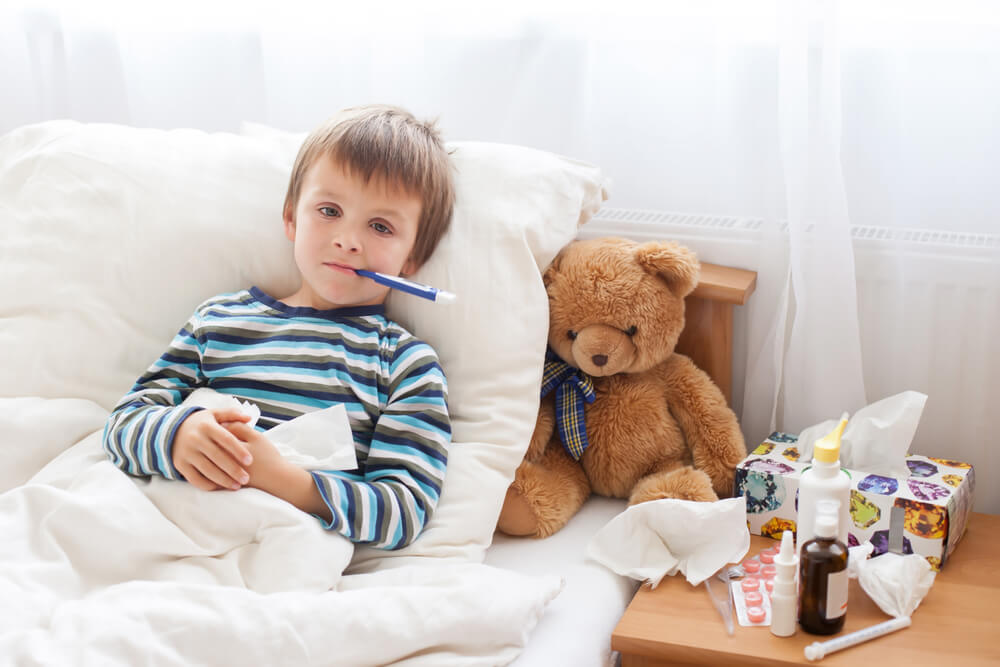A child with a fever is always concerning to a parent. A slight fever may not be a bad thing as it is indicative of your kid’s body fighting off an infection. If you find that your child has a high temperature for a prolonged period, you may need to call your pediatrician. The more you know about fevers and their causes, the easier and less stressful it will be to react to one when it appears.
What Is a Fever and What Causes It in Children?
A fever is the body’s reaction to an invader whether that be a virus, bacteria, or other cause. The hypothalamus, a part of the brain that guides nervous system functions, is responsible for keeping track of the body’s normal temperature. This is typically 98.6 F for most people. The brain acts just like the thermostat in your home. It constantly sends your body messages with the sole purpose of keeping the temperature stable.
Our body temperature can vary slightly throughout the day. This means that a couple of tenths of a degree over or below a child’s normal temperature is acceptable. It is comforting to know that you should not panic for all fevers. Knowing what can cause a fever will help you choose the proper course of action.
Bundling a child up with too much clothing can cause your child’s temperature to rise. This is especially true for newborns if they are in a hot room and overdressed. This occurs because babies do not yet possess the ability to fully regulate their body temperature.
Illnesses and infections are the most common causes of fevers. The increase in body temperature is a sign that the immune system is busy tackling an intruder like the flu.
Inoculations can sometimes cause babies and young children to have a slight fever. Since most vaccines are a weakened part of a virus, it makes sense that this occurs. Your pediatrician should inform you about the possibility of a fever relating to immunization.
Teething can cause your kid’s body enough stress to raise a fever. However, if your child’s temperature is above 100.4 F, then teething is probably not the cause. That’s why it’s important to have an understanding of the basic rules regarding fever in children and infants.

When Is a Fever Too High for a Child?
Answering this question isn’t as straightforward as it may seem. Parents should understand that the reading on a thermometer isn’t directly related to how sick a child may be. Your kid can be in high spirits and playing with a fever of over 104 F. Conversely, a child can be very sick with a temperature of just 99 F.
You can reach a better conclusion when looking at your child’s overall condition. If the child is unusually irritable, has a loss of appetite, isn’t sleeping well, or is experiencing breathing problems, it is prudent to call a good pediatrician. This holds whether or not your kid has a fever.
Simple Guidelines for Fevers in Infants and Children
If your child has a temperature that is below 102 F, there is likely no need for medication unless there is discomfort. However, there is an important exception to keep in mind. When infants who are up to 3 months old have a rectal temperature of 100.4 F, parents should bring their temperature to the attention of a doctor, or they should rush their babies to the hospital.
Moving to children who are between 3 months and 3 years old, a temperature of 102 F or higher should prompt a call to your pediatrician. Your doctor will let you know if there is a reason for concern.
With children over the age of 3, their behavior should be a deciding factor on whether or not you seek medical advice. As mentioned earlier, if they are not exhibiting noticeable changes in their activity levels, you should just keep an eye out for any changes.
Taking Your Child’s Temperature
You should have a reliable thermometer for monitoring your child’s temperature. We recommend a digital thermometer as it is easy to use and easy to read. Make sure to check the accuracy of your thermometer in case you drop it or have other reason to believe it isn’t functioning properly. You want to be able to get an accurate reading of your child’s temperature. If you have any doubt as to whether or not your digital thermometer is working, go ahead and reset it or follow the instructions on how to calibrate it properly.
You can take your child’s temperature orally, rectally, or under the arm by placing the thermometer in the armpit. Keep the thermometer in place until it alerts you that the reading is ready. When it is ready, the thermometer will beep.
A normal temperature for kids varies slightly based on the method of measurement. When taking temperature orally, doctors consider 100 F normal. On the other hand, when measuring under the arm, 99 F is normal. A temperature of 100.4 F is fine when taking your child’s temperature rectally.

Things to Keep in Mind
When trying to decide whether or not to call the pediatrician over a fever, there are a few other factors to consider. Most notably, you should consider any chronic health issues your child has. For kids with underlying medical problems, even a slight fever can be an emergency. A dangerous fever temperature is something that isn’t always discernible to a parent. In cases like these, your doctor should be there to help.
Parents have busy schedules, and it is often difficult to notice every little detail about children. However, if you notice your kid has a fever, try to pay extra attention to your child’s progress. Worsening symptoms may warrant a call to the pediatrician whereas improvement can signal that your child is just coming off a common cold.
If a rash accompanies your child’s fever, you might want to call the doctor. Rashes can be as innocent as a childhood infection or signs of a serious condition such as meningococcemia.
Finding a Good Pediatrician for Your Needs
Do you feel more confident about gauging the importance of your child’s fever after reading this article? A caring pediatrician is not only knowledgeable and competent but also available to ease your mind when you have doubts. If you live in the Miami, FL, area and need a reliable pediatrician, contact Doctor Ana today. Doctor Ana is a general pediatrician who sees kids and adolescents up to the age of 21. Her competence as a doctor matches her friendliness and kindness.




